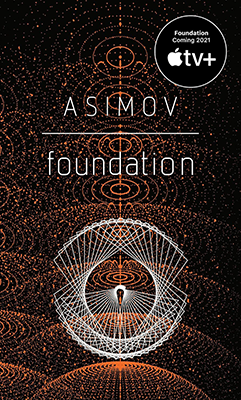Foundation
“Foundation” is the first novel in Isaac Asimov’s famous science fiction series of the same name, originally published in 1951. It is a cornerstone of modern science fiction literature and explores themes of history, politics, and the rise and fall of civilizations. Here’s a summary of the plot and key themes of “Foundation”:
Plot Summary:
The story is set in a future where humanity has spread across the galaxy and established the Galactic Empire, which has lasted for 12,000 years. Hari Seldon, a mathematician and psychologist, has developed a new field of mathematics called psychohistory, which can predict the future behavior of large populations using statistical laws. He predicts the impending fall of the Galactic Empire into a dark age lasting 30,000 years, marked by chaos and suffering.
To mitigate this collapse and shorten the period of barbarism, Seldon establishes the Foundation, a group of scientists and scholars gathered on the remote planet Terminus. Their mission is to preserve and expand human knowledge, ensuring that civilization can be rebuilt more quickly after the Empire’s fall.
Over the course of the novel and the subsequent series, the Foundation faces numerous challenges and crises as it navigates the political intrigues of neighboring star systems and the machinations of ambitious individuals within and outside the Foundation. Through clever strategies and the application of scientific principles, the Foundation gradually gains power and influence, shaping events across the galaxy.
Key Themes:
Psychohistory: The concept of psychohistory, developed by Hari Seldon, is central to the novel. It combines mathematics, psychology, and sociology to predict the behavior of large populations over time. It raises questions about determinism versus free will and the limits of predicting human behavior.
Rise and Fall of Civilizations: “Foundation” explores the cyclical nature of history and the inevitability of the rise and fall of civilizations. It examines how societies evolve, adapt, and ultimately decline, echoing historical patterns seen in human history.
Power and Politics: The novel delves into the complexities of political power and governance. It portrays the struggle for power among factions, the manipulation of individuals for political gain, and the strategies used to maintain control and influence.
Science and Technology: Asimov, a scientist himself, emphasizes the role of science and technology in shaping the future of humanity. The Foundation uses scientific knowledge and technological advancements to overcome challenges and assert its influence in a galaxy dominated by feudalistic political structures.
Legacy and Preservation of Knowledge: The Foundation serves as a repository of knowledge and culture, tasked with preserving the achievements of the past and safeguarding them for future generations. It highlights the importance of education, scholarship, and intellectual curiosity in maintaining civilization.
“Foundation” is not just a tale of space exploration and adventure but a thought-provoking exploration of human society, governance, and the forces that shape our collective destiny. Asimov’s masterful storytelling and exploration of these themes have made the series a classic of science fiction literature, influencing generations of writers and readers alike.

